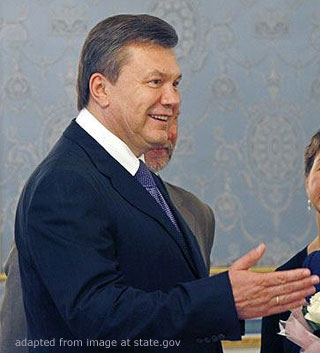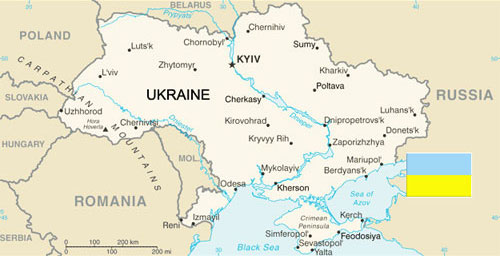Yanukovych’s regime could be about to fall

(Business New Europe KYIV BLOG – bne.eu – Ben Aris in Moscow – January 26, 2014)
Is the regime of Ukrainian President Viktor Yanukovych about to fall? Events in Ukraine are moving very fast now and in the last 24 hours the opposition forces have seized control of about half the regional administrations in the country.
In Kyiv on January 25 protestors also seized control of the the Ministry of Energy and Coal Industry and later in the evening ousted the Berkut riot police from Ukraine House – a large exhibition hall on Europa Square at the heart of the city.
The opposition appears to have the momentum now. The troika of opposition leaders – Vitali Klitschko of the UDAR party, Arseniy Yatsenyuk of the Fatherland party and Oleh Tyahnybok of the nationalist Svoboda party – met with Yanukovych on January 25 and turned down a surprise offer to join the government. Yanukovych offered Yatsenyuk the job of prime minister and Klitschko the post of deputy prime minister.
Arguably they are right to reject the offer, as to join the government would coopt them into the corrupt regime: under the new constitution that came into force in 2004, the real power remains with the president. All that would have happened had the opposition leaders accepted the offer is a rapid descent into stalemate and recriminations that would have delegitimized them in the eyes of the crowd. And the masses on Independence Square (known as Maidan) are determined to go all the way and remain on the streets until they get new elections.
What was most surprising is that Yanukovych made the offer at all. Ukraine reached a second tipping point on January 25 (the first was when fighting broke out on January 19) by storming the regional buildings. Until now there has been a fundamental clash of principles: the protestors have the right to protest (peacefully) but were ignored; Yanukovych, as the democratically elected leader, has the right to lead the country in the direction as he sees fit (which he does badly and for his personal benefit). But by usurping official institutions and taking over regional authorities the protest has begun, what is in effect, a coup d’etat. No state can tolerate an attack on its power and would be in its rights to send in the army.
And that is the surprise. Yanukovych has not sent in the army. Why not? It seems that he has missed his chance. January 25 was the day to do it if at all, to nip the growing insurrection in the bud. As dawn broke over Kyiv on January 26, the opposition was in control of 10 regions, active battles are being fought in another four, mass protests are underway in four more and Yanukovych is in clear control of only five regions, including his home town of Donbas.
Could it be that Yanukovych doesn’t trust the army to follow his orders? Despite the tough talk from the Ministry of Interior and the reports of tanks being moved up to Kyiv, until now Yanukovych has relied entirely on the Berkut special forces. But as the fighting becomes more widespread, it is clear that there are not enough Berkut to effectively protect even the government buildings in Kyiv.
While the Berkut have formed cordons around the government district, which has been the centre of the worst fighting in Kyiv, the other government buildings, like the Energy Ministry buildings, are entirely unprotected.
The same is true in the regional offices: protestors stormed the government offices in Vinnitsa, central Ukraine, but easily overcame the inadequate number of Berkut officers tasked with resisting them.
Yet despite control of the country obviously and rapidly slipping through Yanukovych’s fingers, the regular troops are nowhere to be seen. The time, the last chance, to send the army in was January 25 and yet Yanukovych baulked at the decision.
The offer he made to bring in the opposition leaders to government also suggests that Yanukovych’s room for maneuverer is shrinking. He has been arrogant, to say the least, in talks with Klitschko, refusing to even show up in the midst of the worst street fighting. It testifies to the fact that he has no intention to negotiate with the opposition and is simply playing for time in the hope that the obvious differences between the troika’s leaders, and their shaky control over the crowd, will splinter the opposition movement. However, offering top government posts suggests that their continued united front has scared the president who is now simply trying to hang on power and play for more time.
Yanukovych is a bully and his tactics are those of a bully, not a statesman. A few hundred Berkut, or even a few thousand, should be enough to intimidate a peaceful crowd of even 100,000. However, when the entire country rises up the forces at his disposal are woefully inadequate. Bullies rely on scaring people, but they will always eventually lose against a determine opponent who doesn’t care about the pain or hurt they suffer if they believe in the righteousness of their cause.
The situation in Ukraine remains extremely fluid and Yanukovych may yet call out the army. And the soldiers may be persuaded to fight for him. But with each day that passes, and with each regional authority that falls to the protestors, the more Yanukovych’s legitimacy slips and that of the protestors grows. There is a strong argument that following the events of the last 24 hours it is already too late for him to play the army card and we are now into the end game.

